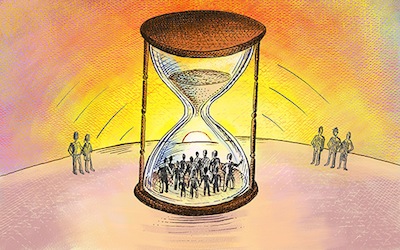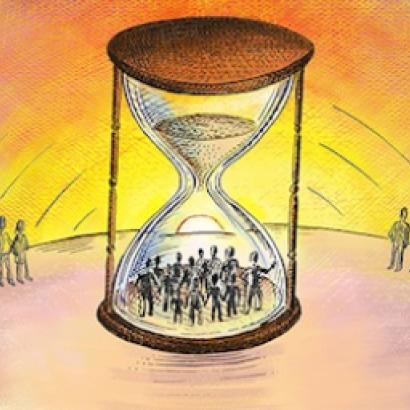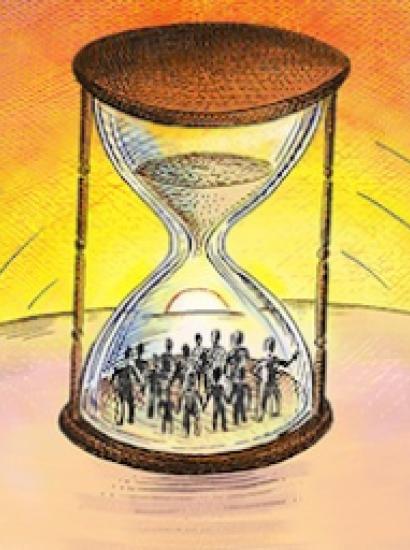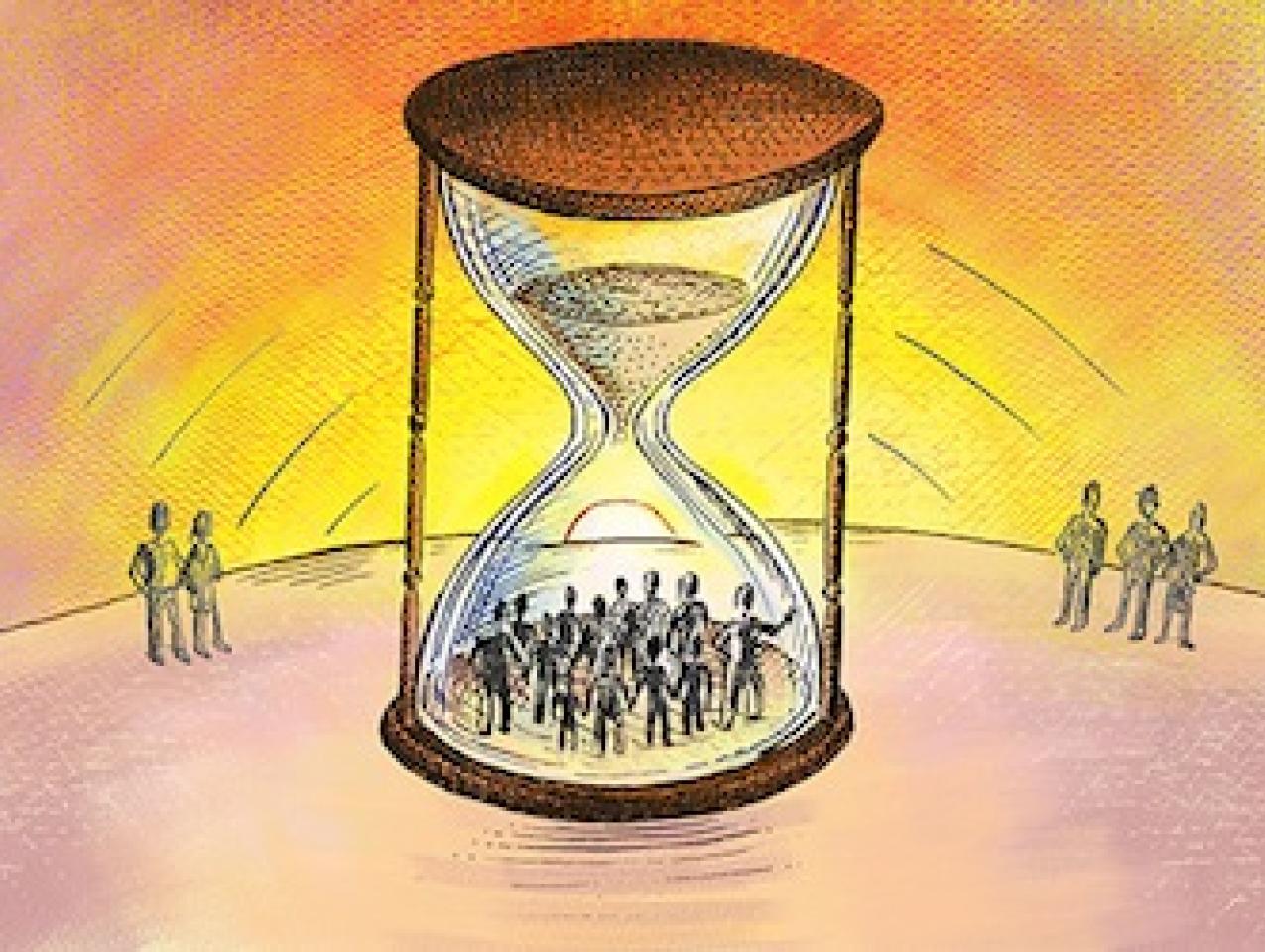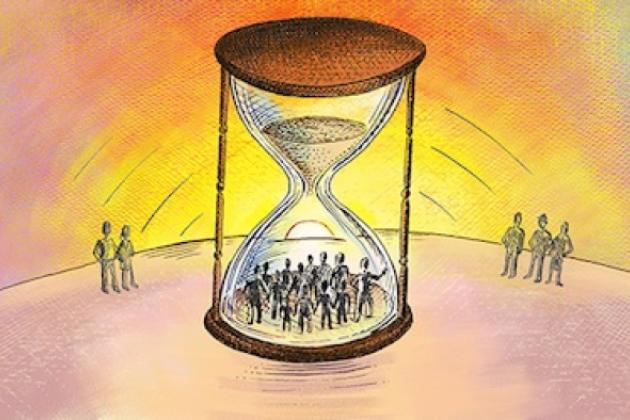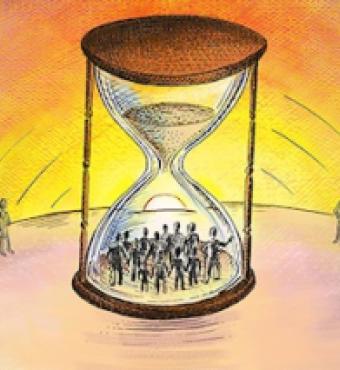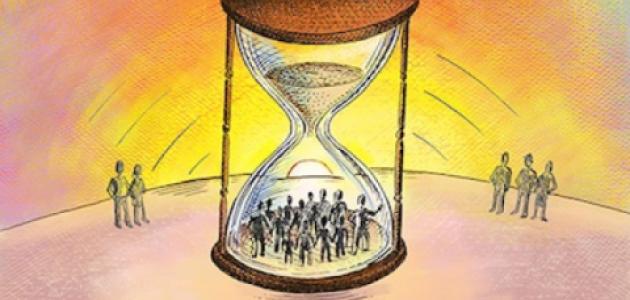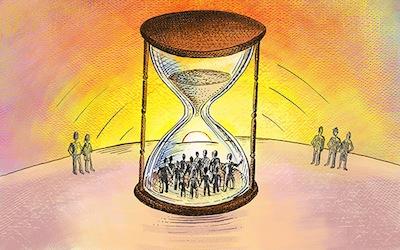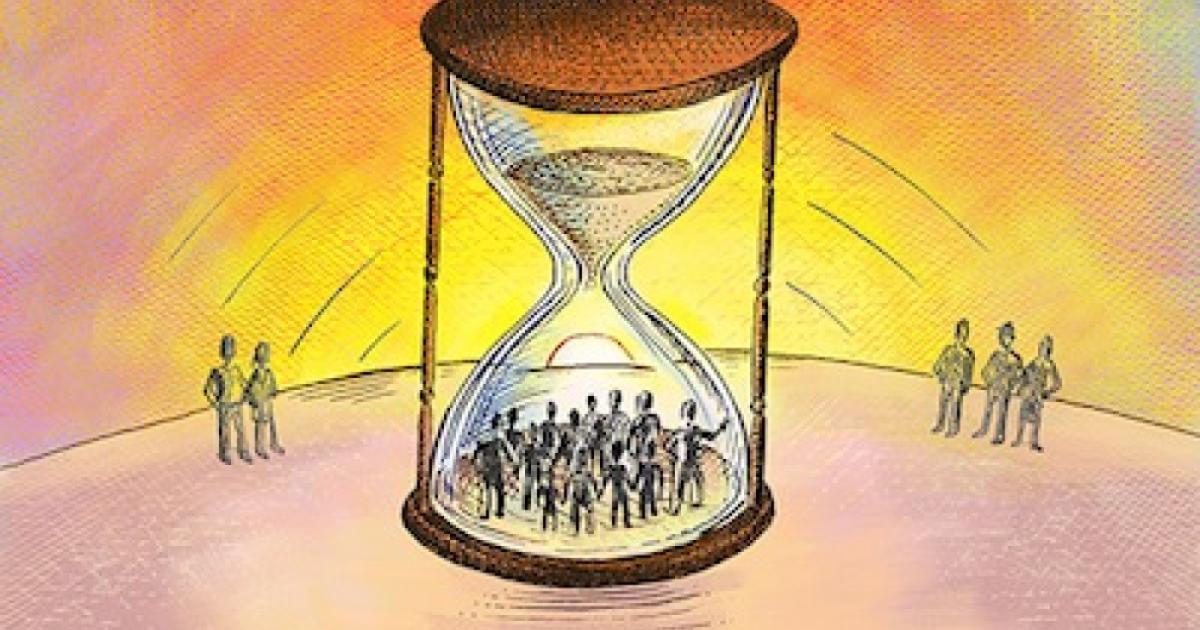- History
- International Affairs
- US Foreign Policy
I’m surprised at how often people dismiss Francis Fukuyama’s “end of history” thesis. Their criticisms usually go something like this: “China’s economy is outperforming the United States’, which is inevitably declining; so much for the end of history.” Or “al Qaeda’s relentless assault on the West proves we’re not at the end of history.” Or “Egypt’s revolution has taken an authoritarian turn; so much for the end of history.” These caricatures are such a profound misstatement of Fukuyama’s argument that it’s difficult to believe the people making them have actually read The End of History and the Last Man.
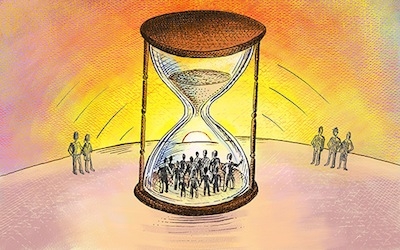
Illustration by Barbara Kelley
What Fukuyama actually argued in that 1992 book, and the 1989 article that presaged it, is that there seems not to be “viable systematic alternatives to Western liberalism.” Fukuyama was not confining his analysis to the political organization of societies, but also incorporating the economics and cultural aspects of “the ineluctable spread of consumerist Western culture.” He argued for “the universalization of Western liberal democracy as the final form of human government” because there are no viable long-term ideological contenders for satisfying human wants from societal organization. And none of the examples cited above actually challenge Fukuyama’s contention; in fact, the paucity of their challenges strengthens Fukuyama’s case.
Two elements of Fukuyama’s argument are crucial to assessing contemporary cases. The first is voluntary association: societies have to be able to choose their form of governance for it to qualify (otherwise it is the imposition of rule by force) and need to have the means to dissolve the political bands which have connected them. Without the consent of the governed, there is no means by which to judge the alternatives. The second element is that the abundance produced foremost by liberal societies is a major attraction of the western model. Human motivation is multifaceted and frequently shifting, but most people seek the prosperity produced by the dynamism of the liberal model, and that liberal model requires a broad sphere of individual choice.
Thus the great challengers to western liberalism, fascism and communism, were defeated by the success of western liberalism, against which their ideological appeal subsided. For Fukuyama’s argument about the end of history to be actually refuted, there needs to arise a system of social organization that people choose to govern them that either rejects prosperity or provides it in equal measure. Neither China nor al Qaeda nor Egypt’s voluntary return to authoritarianism would seem likely to produce both of those conditions.
Start with China. Its communist leaders made a fateful decision in 1973 to take tentative steps toward capitalism. Fundamental for assessing the strength of Fukuyama’s argument is that Deng Xiaoping made that choice because China’s revolution was failing, not because it was succeeding. If “socialism with Chinese characteristics” were working, the second generation of leadership would not have needed to depart from Mao Zedong’s disastrous economic policies. China’s leaders have ever since been trying to paper over the contradictions between their support for economic freedoms that are propelling the Chinese people out of poverty and the repression of political freedoms the Communist Party knows are essential to their continued control.
China’s leaders have placed a big bet that classic liberalism—the belief that good things go together, that freedom fosters prosperity and vice versa—is wrong, and that economic improvement is possible without, and is in fact a substitute for, political freedoms. They are shrewd enough to understand that corruption is deeply corrosive to the purported legitimacy of their rule, concerned enough by its pervasiveness that they penalize it with death sentences.
According to the Dui Hua foundation that monitors human rights in China, the legal system allows the death penalty for 55 crimes, 31 of which do not involve violence. And while execution is most often carried out for violent crimes, it is common for high-profile figures such as upstart mayors, investment bankers, railway ministers, and political cronies to be sentenced to death on corruption charges. But corruption is a natural consequence of the lack of accountability; China’s draconian penalties for corruption perversely demonstrate how damaging the lack of political freedoms are to sustaining the governance structure of the country.
“Authoritarian capitalism” is cause for concern among serious people (among them our Hoover colleague Azar Gat) and is certainly the aspiration of repressive governments, but there is little evidence of sustained voluntary association of the kind that would refute Fukuyama’s thesis. Venezuela may qualify, although few economists would describe it as a successful economy; there are already signs of it crumbling without the charismatic appeal of Hugo Chavez.
In Russia, people are likewise exhausted by the pace of political and economic change, fearful at the squalor and erosion of their standard of living. Like Venezuela, though, Russia’s current economy is less capitalism than one fueled by natural resources that are at the disposal of the state. And Putin is no Hugo Chavez.
Five years ago, the Russian state required oil to be priced at $50 per barrel; that figure is now $117 per barrel for the budget to balance. European states are diversifying to reduce their reliance on Russian supplies, a direct result of the authoritarian shadow Putin casts. More ominously, the Russian model is hostile to innovations of the kind that produced hydraulic fracturing and opened up new reserves in the United States. The real threat to authoritarian capitalism is the lack of political and social freedoms that choke the dynamism necessary for sustained prosperity—and prosperity is what their societal acceptance (to the extent there is acceptance) relies on. Both Russia and China have tilted toward nationalism in an effort to shore up public support, a classic authoritarian diversion.
Then there’s the case of political Islam. Islamist ideology has two strains of thought: one is nihilistic (we will kill ourselves to destroy what we hate), which is al Qaeda; the other is rejectionist (we will build a state to marginalize or exclude those who don’t share our beliefs). Both strains have had opportunities in the past decade and faltered. Still, the rise of Islamism poses a much greater ideological challenge to Fukuyama’s thesis than any other political order.
The nihilist strain falters because of its dissonance with the religion it claims to advance. Islam is not an apocalyptic faith, and the leading scholarly and politically influential centers of its religious learning have rejected violence, Objections from Muslim co-religionists have been the most powerful refutation of the nihilist strain, and those objections have gained considerable ground in the past decade. The terrorization of communities al Qaeda came to control in Afghanistan, Iraq, and now Syria created its own antibodies. To the extent the al Qaeda narrative is regaining adherents and ground, it is not a function of its own appeal but of our and other affected governments’ inaction to help redress grievance and prevent atrocities in Muslim societies like Syria.
The rejectionist strain of Islamism has also suffered considerable setbacks. Political Islam, it should be remembered, gained adherents expressly because of the repression and incapacity of authoritarian governments as, for instance, in Iran (before 1979) and Egypt in the Mubarak era. The Muslim Brotherhood was the only substantial force of political opposition in Egypt under Mubarak. The Brotherhood moved into providing social services where the government could not or would not by feeding the poor, providing disaster relief, and adjudicating family matters. It was the failure of governance that created the political appeal of political Islam as an alternative to corruption and lack of accountability.
The Tahrir Square movement that toppled Mubarak—like uprisings in Iran, Tunisia, Libya, and Syria that have come to be collectively called the Arab spring—had at its core economic as much as political motivations. They were spurred by dissatisfaction with economies that provide too little opportunity and too little prosperity. Mubarak was pushed aside by a combination of high unemployment and a “deep state” that directly controlled 25% of the economy. A society not known for religious intolerance suddenly elected a government that was intolerant in power (or at least became so), then rued the consequences.
One of the most arduous parts of transitioning to a democratic political order is setting the conditions for transitions of power. Authoritarian societies typically have low social trust and weak rule of law, little experience with voluntary political organization or the practice of compromise on which Western liberalism is built. The fear of ‘one man, one vote, one time’ has been exacerbated in Egypt both by the Brotherhood’s efforts to consolidate power as their appeal waned and by the military overthrowing a government so unpopular it would have been voted out at the next election.
Neither Mubarak nor the military junta that ruled the 18 month interregnum nor the Muslim Brotherhood elected in the first flush of democracy nor the military junta ushered into power by the protests of 20 million Egyptians has made a dent in the sources of public frustration. They have all instead perpetuated the problems in Egypt because they lack the broad public consensus on the policies necessary to make Egypt prosperous. The Brotherhood got an economic lifeline from Qatar; the military now gets one from Saudi Arabia. But neither was willing to risk proposing or implementing economic reforms that would upend the system’s current beneficiaries, be deeply unpopular in the short term, create a turbulent transition, and empower new economic and political forces. Economic dysfunction is a politically rational choice, as Daron Acemoglu and James Robinson argue in Economic Origins of Dictatorship and Democracy.
The recent referendum approval of the military junta’s proposed constitution provided the government with a veneer of public legitimacy: as the government spokesman emphasized, while only 38 percent of eligible Egyptians voted in the referendum, that is a higher percentage than voted to endorse the constitution the Brotherhood had put to a referendum eleven months earlier. It is tempting to explain Egypt’s descent back into authoritarianism as the imposition of military rule. And the Egyptian military has been brutally repressive: killing hundreds of protesters, instituting martial law, arresting the top thousand Muslim Brotherhood leaders, putting President Morsi on trial for his life, banning the organization and confiscating its finances, cracking down on secular activists, and implementing other restrictions on civil society. But, as Eric Trager emphasized on the anniversary of Mubarak’s overthrow, “Egypt’s autocratic recidivism is often blamed on Egypt’s poisonous media and draconian military-backed government, thereby casting ordinary Egyptians as passive actors in their own country’s story. But they aren’t.”
There is a fundamental historicism in Hegelian notions of progress—and, as Fukuyama acknowledges, in his own view. But what if human society and political organization is not progressing toward ever-greater satisfaction or good? What if democratic polities choose authoritarianism? People may. The Egyptians certainly have. They appear to be willingly trading fundamental liberties for security, both political and economic.
That people choose authoritarian capitalism in the short term does not actually refute Fukuyama: his contention is that only Western liberalism can produce the ecosystem of prosperity and governance that makes societies ultimately successful in the eyes of their constituents. And that is how to understand the cataclysm Egypt is undergoing: the people there have chosen to regress from freedom out of fear of where their country was headed, and to regroup and focus in the near term on prosperity. Unfortunately, authoritarianism is difficult to dislodge once it sinks its roots, and cannot produce the kind of prosperity Egyptians seek.







